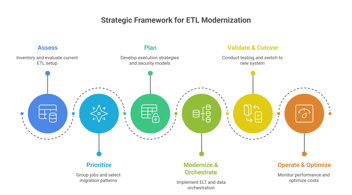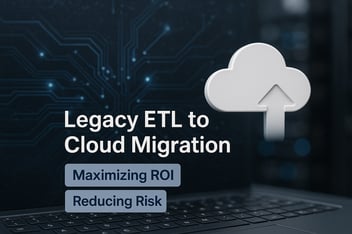
Introduction
In today's race toward cloud-native infrastructure, the biggest speed bump isn't ambition, it's the tangled mess of legacy systems standing in the way. Organizations seek agility and modernization but are often paralyzed by the fear of disrupting complex ETL pipelines, rigid database schemas, and outdated reporting tools.
Modernizing this fragile, high-stakes ecosystem feels like trying to rewire a plane mid-flight.
Fortunately, there's a way to avoid crash-landing your digital transformation. The PDI Analyzer, an AI-powered automation platform from Pacific Data Integrators, is designed to tackle the hardest part of data modernization: Ensuring Data Quality in AI Systems to provide actionable insights for scalable, future-ready assets.
-
Sluggish Performance: Legacy ETL jobs were never built for the real-time demands or volumes of today's data environments. They choke on the growing load.
-
Skyrocketing Support Costs: Maintaining these systems requires niche expertise, expensive licenses, and countless hours of patching code no one wants to touch.
-
Data Silos Everywhere: With systems that don't communicate effectively, achieving a unified view of the business becomes more of a dream than reality.
-
Risky Manual Migration: Even if you decide to migrate, doing it manually introduces risk. Just one incorrect mapping or missed transformation step can corrupt years of reporting logic.
-
Comprehensive ETL Assessment: Scans legacy ETL pipelines for redundancies and inefficiencies, analyzing dependencies across tables and data sources. Generates pre-migration optimization reports to reduce workload.
-
Data Warehouse Evaluation: AI in Master Data Management: Enhancing Data Quality and Governance. Assesses complexity, highlighting inefficiencies and data issues. Suggests indexing and partitioning for cloud performance.
-
BI Report Optimization: Scans BI reports, dashboards, and queries for bottlenecks. Identifies unused or redundant reports to reduce migration effort. Suggests query and data model optimizations for performance.
-
Reduced Redundancy: Achieved a 50% reduction in redundant ETL processes by identifying and eliminating inefficiencies.
-
Performance Boost: Realized a 40% improvement in cloud data warehouse performance through optimized schema and query analysis.
-
Streamlined BI Reports: Attained a 30% reduction in unnecessary BI reports, enhancing dashboard performance and accelerating time-to-value for business users.
-
Optimized Migration Planning: Provided actionable insights that improved migration planning and reduced overall effort.
-
Enhanced Dashboard Performance: Suggested query and data model optimizations that led to improved dashboard responsiveness and user satisfaction.
-
Global Healthcare Organization: Faced with an extensive ETL pipeline built over a decade using Informatica PowerCenter, the organization planned a migration to a modern cloud ETL platform. Lacking visibility into existing ETL complexity, dependencies, and performance bottlenecks, they utilized PDI Analyzer to scan legacy ETL pipelines, analyze dependencies, and generate pre-migration optimization reports. The result was a 50% reduction in redundant ETL processes, identification of transformation inefficiencies, and improved migration planning.
-
Financial Institution: Operating an on-premises Teradata data warehouse struggling with scalability and performance, the institution aimed to transition to Google BigQuery. PDI Analyzer was employed to analyze schema, indexing, and query performance, assess complexity, and suggest indexing and partitioning for cloud performance. This led to a 40% improvement in cloud data warehouse performance, reduced migration effort, and optimized data modeling for efficiency and scalability.
-
Retail Company: Relying on legacy BI tools like Cognos and BusinessObjects, the company suffered from slow dashboard performance and outdated data models. Planning a migration to Tableau and Power BI, they used PDI Analyzer to scan BI reports, identify unused or redundant reports, and suggest query and data model optimizations. The outcome was a 30% reduction in unnecessary BI reports, improved dashboard performance, and faster time-to-value for business users.
-
Customization Still Matters: While the platform automates a lot, some highly customized workflows may need tailored post-analysis refinement.
-
Data Governance Alignment: Ensure your cloud targets are set up with proper access controls and lineage tracking before migration.
-
Training & Handoff: Empower your team to manage and extend the new pipelines and reports after analysis, training and documentation support is critical.
-
Migration Phasing: Plan for phased rollouts by domain or business unit for easier validation and reduced disruption.

Pacific Data Integrators Products
Pacific Data Integrators Offers Unique Data Solutions Leveraging AI/ML, Large Language Models (Open AI: GPT-4, Meta: Llama2, Databricks: Dolly), Cloud, Data Management and Analytics Technologies, Helping Leading Organizations Solve Their Critical Business Challenges, Drive Data Driven Insights, Improve Decision-Making, and Achieve Business Objectives.




